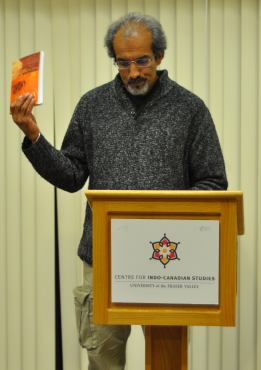By Nadine Moedt (Contributor) – Email
Print Edition: March 21, 2012
 The seventh annual Ehsaas South Asian Readers and Writers Festival took place at University House this past Wednesday, March 14. UFV’s writer-in-residence Anosh Irani hosted the event and was one of four authors reading to a fully-engaged audience.
The seventh annual Ehsaas South Asian Readers and Writers Festival took place at University House this past Wednesday, March 14. UFV’s writer-in-residence Anosh Irani hosted the event and was one of four authors reading to a fully-engaged audience.
Irani opened the evening with a selection from his second novel, The Song of Kahunsha, which follows the lives of several abandoned children in Bombay struggling for survival amidst the racial rioting of 1993. A central feature of his reading was the description of a beggar without arms and legs, someone Irani had actually witnessed in the Mombai train station. The image had a powerful effect on the audience, as expressed by several members in the question-and-answer period that followed the readings.
Following Irani, Surjit Kaley, a Canadian poet and resident of British Columbia, read from her newest book of poems Colours of My Heart. Kaley’s poems reflected the very real lives of immigrant women whose stories are, as she puts it, “no fairy tale to tell.” Kaley colours her emotions; avoidance is a “dark grey,” and shame is “pitch dark blackness.” Her poetry weaves together Indian mythology and the modern Canadian experience for all women, providing an insightful illustration of adversities all women face in this world.
UFV English instructor Rajnish Dahwan then introduced Dr. Paul Sunga. In addition to his degree in medicine, Sunga’s long list of credentials includes experience as a teacher, journalist and medical advisor in a rural town in South Africa during the press blackouts – a result of the anti-apartheid movement of the mid-1980s. This experience provided the inspiration and material for his second novel, Red Dust, Red Sky. Sunga read the first few pages of his novel, which explores the experience of a young girl growing up under the South African racist system and the conflict between traditional and scientific attitudes related to the HIV epidemic. Interestingly, Sunga noted that the whole idea for his novel came to him in a dream.
Sunga also gave the audience a preview of his latest, work-in-progress The Age of Wealth, a novel described by Sunga as “semi-comedic,” which dramatizes the plight of several economic advisors in Kenya who are abducted by their ostensible guides. Sunga read his account of the abduction, which is humorously described by each of the abductees. Their individual socio-economic status is analyzed in detail in a very tongue-in-cheek manner.
Last to read was Fauzie Rafique. Published in both Pakistan and Canada, Rafique is a seasoned and controversial writer. Rafique read first from her 2007 novel Skeena, a work that spans 30 years, detailing the life of a Muslim-Canadian woman. Rafique explored the cultural differences and changing environment throughout Skeena’s life, recounting the cultural and religious influences that shaped her. Rafique’s narrative is quirky; Skeena arrives in Canada, meeting her husband for the first time, and in Skeena’s words “it was unfortunate that I was expected to sleep with him too.” Skeena’s story provides an interesting and thought-provoking glimpse into the the mind of a Muslim woman.
Rafique read several of her poems from her collection of English and Punjabi poetry titled Passion Fruit. Ending the night on a lighter note, Rafique read a poem called “The Sharia Compliant Bra,” which described an argument between a Muslim fundamentalist mother and her daughter over the purchase of a padded bra, during which the mother sentences her daughter to washing her mouth out with soap “five times a day for seven years.” During the discussion that followed the readings, Rafique was asked whether she had a price on her head after publishing such a satiric poem. In response, Rafique agreed that the heavier the oppression, the “better opportunities for counterattack and satire.”
UFV is fortunate to have the resources of the Centre for Indo-Canadian Studies which hosts this festival. It is a pleasure to to be reminded of how much talent exists in our various communities, and for both writers and readers to be given the opportunity to listen and learn.
